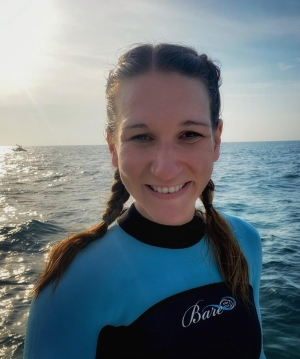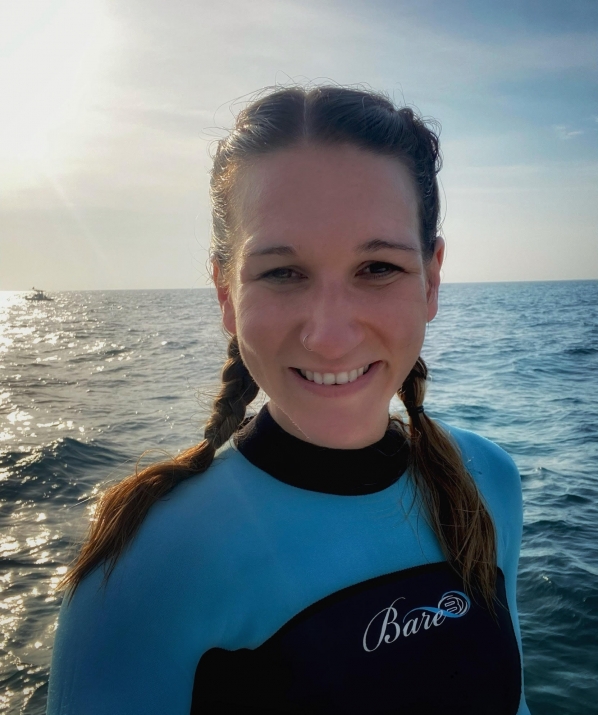Why did you become a biologist (and specifically the type of biologist you are)?
I have always been fascinated with the water and aquatic animals, but I credit my current career as a marine biologist with my first time viewing “Shark Week” on Discovery Channel when I was 10 years old. I grew up in the landlocked state of Wisconsin, and at that time I had no idea that people could have a career that let them work underwater studying marine creatures. Once I discovered that this was a viable career path, I was convinced it was my calling and that I would study sharks. My parents encouraged me and even allowed me to get certified to scuba dive when I was 12. In high school and the early part of college, I took a brief detour and thought I wanted to be a doctor, which seemed more practical at the time. In the end, I circled back after taking an ecology course that reminded me of my love for biology.
When did you know this was your career choice (Discuss the process through which you ended up choosing this as a career.)?
After rediscovering my love of biology, I did a study abroad my final semester of college on the Caribbean island of Bonaire. While in Bonaire, I completed my first coral reef research project looking at the abundance of prey fish species as indicators of human impact on coral reefs. I catapulted my enthusiasm for marine research into a Master’s degree from Georgia Southern University and then into a Ph.D. program at Louisiana State University (LSU). At LSU I took a course on microbial community diversity, and I began to build an interest in how microbes that live within reef-building corals may impact the corals’ survival and resilience to environmental changes. This question was the topic of my Ph.D. dissertation research and is still the focus of some of my current research.
Who or what is your inspiration?
Corals! Corals are such intriguing creatures. They have survived for millions of years and live in almost all of the ocean’s habitats from tropical coral reefs to extremely hot hydrothermal vents to the cold darkness of the deep sea. Further, they are responsible for making the reef structure that so many other marine creatures rely on, so their survival is paramount to maintaining the health of our oceans. I want to know how their interactions with microbes have helped them survive so many changes to the world’s oceans.
If you had to do it again, what would you be?
This is a hard question because I love marine biology and my current career so much that I can’t imagine being as happy in another field. However, I think if I had to choose something different, I would be a freshwater ecologist. I’m from the Midwest and grew up around the Great Lakes so being able to study their unique ecology, especially the microbes living in the cold land-locked lakes, would be interesting. Working on freshwater microbes would also open opportunities to work in many other states that have lakes, rivers, and streams, but don’t have any ocean coastlines.
What courses do you currently teach?
I’m currently teaching BIO 3312 Environmental Studies. I love this course because it allows me to help students understand the connections between the environment, politics, and social/cultural traits.
Are you planning to teach any new courses in the near future?
For the time being, I plan to stick with teaching Environmental Studies.
What do you like most about teaching?
I enjoy interacting with the students. College students are bright and each of them have a unique view of the world because of their upbringing, interests, and skills so I find it very exciting to engage with them in discussion about our changing planet and society.
What is the overarching goal of your research program?
My current research interests are focused on the role of microbes in marine environments. More specifically, I’m interested in the impact of large-scale changes to marine microbial communities, both those living with a host and those free-living in the marine environment, in response to human impacts. I’m also interested in the functional roles of marine microbes in their environment and how these roles may change or adapt with shifts in host genetics or reef landscape changes.
Here at ASU, I’m working as postdoctoral researcher with Dr. Cara Fiore, and our project is focused on the role of sponges (and their associated microbial symbionts) in the cycling of dissolved organic nutrients in coral reef ecosystems. I’m particularly interested in how the nutrients “exhaled” by a sponge underwater may be used by nearby coral colonies.
What advice do you have for undergraduates/graduates pursuing degrees in biology these days?
I think for undergraduates that are interested in biology it is critical to get experience working in a lab and doing research. Even if your goal is not to be a research biologist, but perhaps to go on to medical/dental/vet school, the background experience in research will help you to think critically about the science happening in your field. Many research labs prefer to take on younger students so getting involved early in your college career is helpful. I also highly suggest testing out a few different labs because your interests can evolve as your education advances. For graduate students, it is important to follow your interests. Don’t be afraid to speak to your advisor about new interests that might be outside of their typical work because they may help you integrate it into work you’re doing in their lab or be able to direct you to a new lab that may align more with your interests. Communication is the key to success in a science career.

